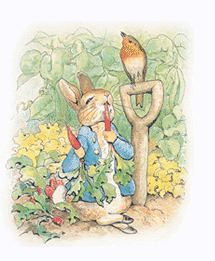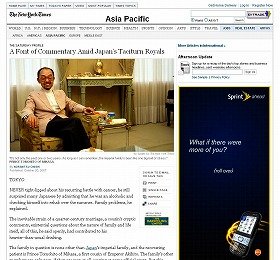| Tweet |

http://www.j-cast.com/2007/10/22012452.html
寛仁殿下「非行少年だった」 米紙に衝撃告白のすごい中身
2007/10/22
自らの「アルコール依存症」という病名を公表されるという、皇室としては異例の決断をなさった三笠宮寛仁さま(61)が、新たな衝撃発言をした。米紙のインタビューに対して「皇室はストレスの塊のようだ」と、自身のご病気の原因が皇室の環境にあることを強く示唆したのだ。皇族が、外国メディアに対して、自身や皇室の問題について告白するのは極めて異例だ。
「ストレスの塊のようなものでした」

米紙とのインタビューは1時間40分にわたって行われた
2007年10月20日付けの米ニューヨーク・タイムズ紙に掲載された。インタビューは赤坂御用地で1時間40分にわたって行われたという。
寛仁さまは、ご自分のアルコール依存症の背景には、ご自身の家庭や皇室でのストレスが背景にあるとされ、
「(ストレスは)ここ1年や2年のことではありません。思い出せる限りでは、ストレスの塊のようなものでした」
「家庭の中で、物事がめちゃくちゃになったんです。26年も一緒にいれば…、わかるでしょ?」
と、苦悩を告白なさった。
さらに、「皇室内部には、様々な問題がある」として、その一例として皇太子さまが04年5月の記者会見で「雅子のキャリアや、そのことに基づいた雅子の人格を否定するような動きがあったことも事実です」と発言なさったことを取り上げた。寛仁さまは皇太子さまに対して、発言についてさらに説明するように求める長い手紙をお送りになったが、
「(皇太子さまが)手紙に返答していれば、いくらかの進展はあったのではないかと思う。だが、意見を述べたことに対して礼を述べる返事しかなかった」
のだという。
ご自身ががんでの入退院を繰り返しておられることについては
「この家系のDNAは、非常にがんの影響を受けやすいんです。2世代で6人が、すでに(がんに)かかりました。ですから、いつ自分の番が回ってくるのだろうか、と心配したものです」
と、遺伝による影響があるのではないかとの見方を示した。
単に存在していることに意味がある
話題は、寛仁さまの青年時代にも及んだ。すべての皇族に警備がつくようになる前は、ご自身で山手線に乗って学習院に通っておられたのだという。他の皇族と比べて、寛仁さまは「非行少年」だったといい、近くの北朝鮮系の学校に通う生徒といざこざを起こすこともあったのだという。
「彼らとは、すごく戦いました。彼らは学習院の制服を見つけると、いつも襲いかかってきたんです」
寛仁さまは1982年、社会福祉活動に専念したいとして「皇籍離脱発言」を行い、世間を驚かせた。この背景については語らなかったが、皇室については、このように述べたという。
「皇室は、要するに何なのかと聞かれれば、良く良く考えた上での結論というのは、私たちの(存在する)意味というのは、私たちが単に存在していることにある、ということです」
「存在することの意味は存在すること」と、半ば哲学的な見解をお示しになった形だが、皇室の役割についても、独特の見解を披露なさった。
寛仁さまによると、皇族は、単に
「朝起きて、朝食を食べて、昼食を食べて、夕食を食べて、眠りに就く。これを1年365日繰り返す」
ことで役割を果たすことができる、というのだ。
そして、「生まれ変わるとしたら、また皇族をやりたいか」という問いに対しては、5秒の沈黙の後に、当初は
「もう十分です。61年間で、やりたいことは本当にみんなやりました。古いしきたりも打破しました。B型なので、新しいことをやってみたいです」
とお答えになったが、これを修正。皇族の暮らしにも庶民の暮らしにも、当然それぞれに良い点と悪い点がある、とした上で、
「皇族にしろ(日本)国民にしろ、『誰が、より幸せか』と考えたとき、そんなものに答えはないですよ。ない」
とお答えになった。
========================================
http://www.nytimes.com/2007/10/20/world/asia/20tomohito.html?_r=1&oref=slogin
http://www.nytimes.com/2007/10/20/world/asia/20tomohito.html?pagewanted=2&_r=1
The Saturday Profile
A Font of Commentary Amid Japan’s Taciturn Royals(The New York Times)

By NORIMITSU ONISHI
Published: October 20, 2007
TOKYO
NEVER tight-lipped about his recurring battle with cancer, he still surprised many Japanese by admitting that he was an alcoholic and checking himself into rehab over the summer. Family problems, he explained.
The inevitable strain of a quarter-century marriage, a cousin’s cryptic comments, existential questions about the nature of family and life itself, all of this, he said openly, had contributed to his heavier-than-usual drinking.
The family in question is none other than Japan’s imperial family, and the recovering patient is Prince Tomohito of Mikasa, a first cousin of Emperor Akihito. The family’s other members are only seen, if they are seen at all, waving at some official event. But this prince has never shied away from offering his personal opinions on everything from preserving the throne’s unbroken male line — even, he wrote mischievously two years ago, by reviving the concubine system — to the private burdens of royalty.
“It’s not only the past one or two years,” the prince said of the stress behind his alcoholism. “As long as I can remember, the imperial family’s been like one big ball of stress.”
On a recent afternoon, Prince Tomohito, 61, known as the “bearded prince” for his goatee and mustache, appeared in good spirits at his residence in the Akasaka Estate, the sprawling walled-off, wooded grounds in central Tokyo that is home to most of the imperial family’s 23 members.
A beige jacket hung loosely on the prince, still well underweight because of his various illnesses. He wore dark blue slippers that appeared to be the only concession to Japanese custom in a Western-style reception room dominated by a grand piano and chandeliers. Having studied for two years at Oxford, he sometimes sprinkled his Japanese with English words.
The prince has been in and out of the hospital since he was found to have throat cancer some 16 years ago, and last year he underwent his eighth operation for cancer. In a society where people remain reluctant to disclose their illnesses, the prince said he saw “no meaning in hiding” his cancer and even wrote a book about it.
“Our family’s DNA is highly susceptible to cancer,” the prince said. “In two generations, six of us have already been afflicted with it. So I had always wondered when my turn would come.”
Still, the prince attributed his recurring cancer to stress, the same kind of stress that, he has said publicly, first led to his overdrinking in his 30s and aggravated it in the last couple of years.
The prince, who has two daughters with his wife, Princess Nobuko, cited difficulties at home. “Things became messed up inside our home,” he said, adding, “When you’ve been together for 26 years, well, you know.”
Problems in the extended family also affected him deeply.
“There are all sorts of problems now inside the imperial family,” he said. “For example, I threw myself into the whirl surrounding the crown prince’s comments about personality denial.”
The prince was referring to an extraordinarily emotional news conference given three years ago by Crown Prince Naruhito about his wife, Princess Masako, the Harvard-educated former diplomat who has long suffered from depression and rarely appears in public. It is believed that her illness stems from the intense pressure she felt to bear a male heir to the throne — pressure that was relieved last year with the birth of a son to the crown prince’s younger brother and his wife.
“There has been a move to deny Masako’s career and personality,” the crown prince said, in comments that seemed to put an individual’s happiness on par with, if not above, the imperial family itself, comments that were endlessly scrutinized for their exact meaning and intended audience.
Prince Tomohito said he wrote the crown prince a long letter asking for further explanation.
“If he had responded,” Prince Tomohito said, “I think we could have made some progress. But there was only a reply thanking me for my invaluable opinion.”
PRINCE TOMOHITO was born four days after the Emperor Hirohito renounced his divinity on New Year’s Day in 1946. A year later, the Imperial Household Law of 1947, imposed during the American occupation, abolished 11 other branches of the imperial family, thereby shrinking the pool of male heirs to the Chrysanthemum Throne.
The prince describes growing up in a simpler age, riding Tokyo’s Yamanote Line by himself to the Peers School, before bodyguards were assigned to all royals. Compared with the other royals, the prince said with a smile, he was a “delinquent” youth who got into skirmishes with students at a nearby school run by North Koreans.
“We used to fight with them a lot,” he said. “Whenever they’d spot the Peers School uniforms, they’d come at us.”
After college the prince took up the kind of active life unknown to this imperial family. He focused his considerable energies on helping the disabled. He led efforts to build facilities for the disabled and even taught some of them to ski.
Like many a postwar Japanese salaryman, the prince found meaning in work.
“I was a workaholic,” he said.
Perhaps there were nagging doubts, too.
In 1982 the prince, then 36, grabbed headlines when he said he wanted to secede from the imperial family, citing his desire to devote himself to his work. The prince declined to say what lay behind his 1982 wish, perhaps because the passage of a quarter of a century had quelled whatever doubts there were.
“If you ask me what the imperial family is all about, and I think and think and think about it, the very final conclusion is that our meaning lies in our simply existing,” the prince said, holding a cigarette holder in his left hand, the first of three cigarettes he would smoke in a 100-minute interview.
The royals, he said, could fulfill their duties simply by “waking up in the morning, eating breakfast, eating lunch, eating dinner, then going to sleep, repeating that 365 days a year.”
ACCORDING to Japanese myth, the first emperor, Jimmu, a descendant of the sun goddess Amaterasu, began his reign 2,667 years ago, though historians trace the start of Japan’s imperial system to the fourth or fifth century. Emperors are said to be descended in an unbroken patrilineal line, with each generation passing on the male Y chromosome to the next.
“The Y chromosome resides in my body,” the prince said. “It is the same thing that resided in Emperor Jimmu — it’s extremely spiritual.”
That is why the unbroken male line must be preserved at all cost, he said. The other imperial branches, abolished during the American occupation, could be restored or adoptions permitted from within those families. And concubines?
“That is a joke,” the prince said, in English, with a twinkle in his eyes.
Would the bearded prince choose to return, in another life, as a royal?
After a five-second silence the prince said with a laugh, “I’ve had enough. I’ve really done all I wanted in 61 years. I’ve broken old conventions.” He then referred to a popular belief in Japan: “I’m blood type B, so I like to try new things.”
The prince then refined his answer, saying that both imperial life and the commoner’s life no doubt had their advantages and disadvantages. “So when you think about who is happier, whether it’s the imperial family or the people,” the prince said, “there is no answer, none.”
|
|
▲このページのTOPへ HOME > 政治・選挙・NHK43掲示板
フォローアップ:
|
|
投稿コメント全ログ コメント即時配信 スレ建て依頼 削除コメント確認方法
|
|
 題名には必ず「阿修羅さんへ」と記述してください。
題名には必ず「阿修羅さんへ」と記述してください。
掲示板,MLを含むこのサイトすべての
一切の引用、転載、リンクを許可いたします。確認メールは不要です。
引用元リンクを表示してください。
|
|
|
|
|
|
|
|